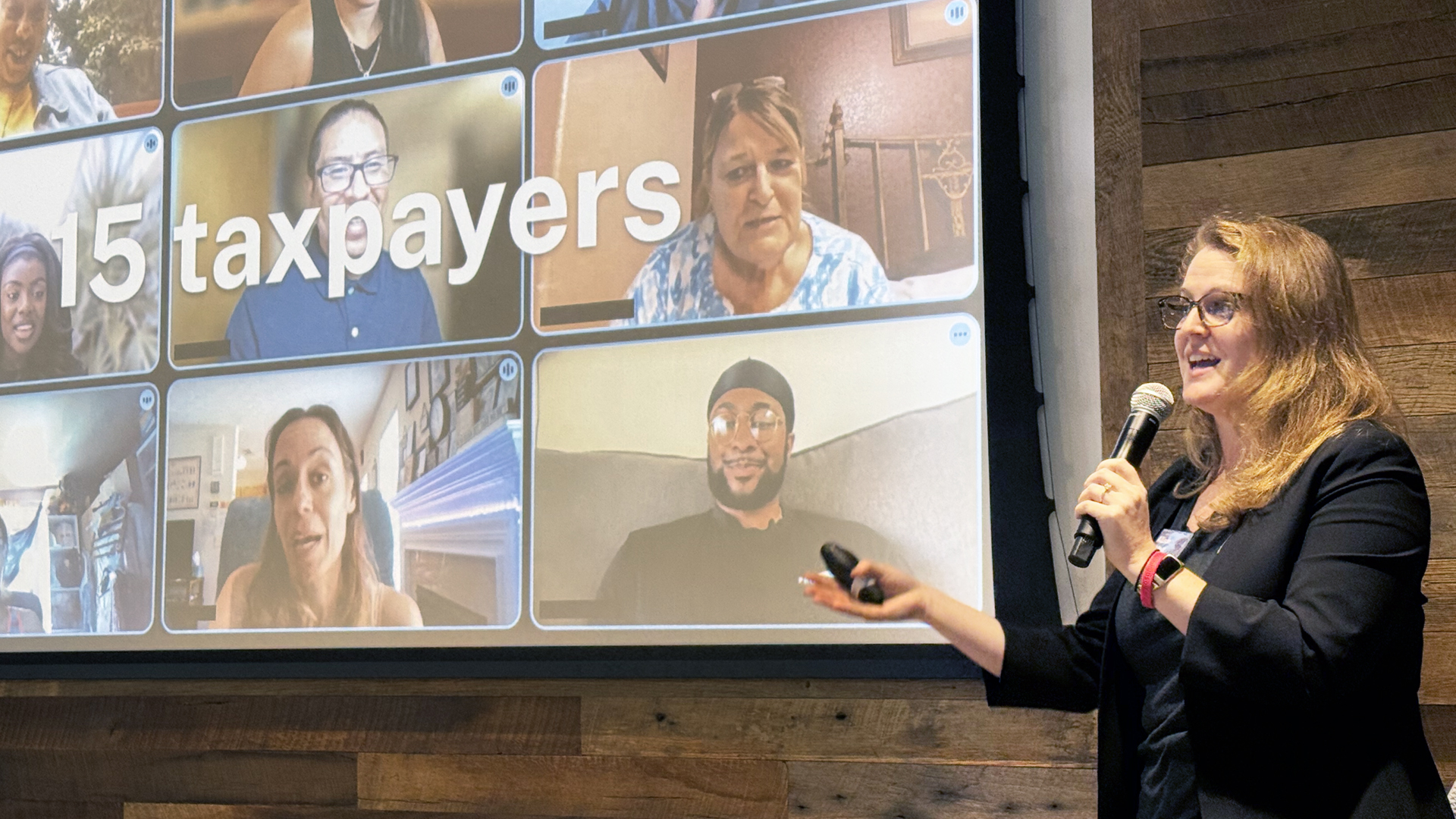Update
Charting the Path to Keep Direct File Alive: A Recap of ESP’s Future of Tax Filing Fellowship Convening
10. 20. 2025

In late September, advocates, state officials, researchers, and funders gathered in New York for an Economic Security Project convening to culminate the Future of Tax Filing Fellowship. The gathering included the builders and designers of Direct File, namely our fellows (Chris Given, Merici Vinton, Allison Abbott, Gabriel Zucker, Jen Thomas) alongside former IRS Commissioner Danny Werfel, former NEC Deputy Director Bharat Ramamurti, California’s Deputy Controller for Taxation Hasib Emran, Roosevelt Institute Principal Felicia Wong, and others who are working on making the tax system work better for American families.
The group gathered to document the lessons from the IRS Direct File tool, and to chart a forward path for simplified tax filing and innovative tax reform. Despite the reality that the Trump Administration put an end to Direct File this past year, this was not a post-mortem; it was a strategy session about what’s still possible and how to prepare for what’s next.
The Direct File tool, which allowed for free tax filing for eligible filers in less than an hour, was a roaring success. It achieved 94% user satisfaction by combining in-house technical teams, rapid iteration, and leadership that protected the team from interference. The tool demonstrated that government can build elegant digital products that serve people well. Advocates across the country moved quickly to embrace it and to see it used in their communities. The speed with which this program was developed was essential—the team designed and shipped data pre-population in two weeks, reducing return rejection rates by 25% before industry could object. The faster you deliver tangible results, the harder it becomes for opponents to kill a program. Most importantly, the effort proved that when you remove friction from accessing government benefits, people use them, and that builds trust: 86% of users in the first year reported it increased their trust in government.
Now, with Direct File on ice, states and nonprofits are picking up where the tool left off.
What States and Civic Tech Organizations Can Do Now
Much of the convening was spent strategizing what leaders in the tax reform space can do now that there is a federal government hostile to what was built. Some groups and states have already begun to innovate and show what can be next. The Future of Tax Filing fellows workshopped their recommendations on how to carry forward the spirit of Direct File, through ideas that can be advanced now in states as well as federal changes that should be prepared for the next iteration of Direct File. These ideas will be published soon in a full report but some initial ideas for states are here like year-round support for gig workers. Among other ideas getting underway:
Colorado is using existing discovery processes to identify residents owed refunds, then pre-populating their returns. Maryland has a comptroller focused on increasing EITC access and is exploring data-sharing agreements to identify non-filers participating in other benefit programs. Washington State worked with tax prep companies to add state tax credit questions and plans retroactive outreach to past claimants. California is building an API to connect federal and state returns, reducing redundant data entry.
New Practice Lab at New America is actively engaged with all of these states to test innovations ranging from data-sharing agreements to outreach campaigns for prior-year credit claims. And, Code for America previewed plans for improvements to their GetYourRefund Virtual VITA platform, as well as new efiling tools designed to help low-income households claim key credits.
Equally important is preserving institutional knowledge. Part of our convening meant to draw out the Direct File team’s expertise about building the technology, working with states, and navigating IRS systems. We know these should be documented and maintained so the next administration could restart the Direct File program immediately, and pick up right where we left off.
Further, the fellows proposed a new suite of tools, for developing robust civic tech that takes some of the technologies developed for Direct File and makes them more broadly available. Their vision would enable software engineers and tax and benefit experts to speak a common language and thus more quickly and accurately develop tools like Direct File to ease access to tax and safety net benefits. More on this soon.
What This Means for Funders
The convening demonstrated that simplified tax filing and improved access to tax credits doesn’t depend on the federal Direct File alone. States are innovating right now. Nonprofits are building tools that serve people today. Civic technologists are preserving the infrastructure and expertise that made Direct File possible.
For funders, this means supporting the work that keeps innovation alive during periods of federal uncertainty. Fund the documentation of lessons learned. Invest in nonprofit and state-level solutions that serve people now. Recognize that supporting civic tech infrastructure is supporting the future.
Direct File may be in hibernation, but the spirit of that work—the commitment to serving people, the willingness to move fast, the insistence on centering equity—can keep moving forward. States are proving it. Nonprofits are proving it.
Economic Security Project’s Future of Tax Filing Fellows conducted research on tax code reform, civic tech infrastructure, and expanding access to tax credits. Results from this convening will inform a forthcoming report on policy recommendations for the next chapter of simplified tax filing.